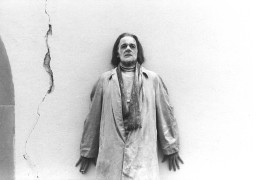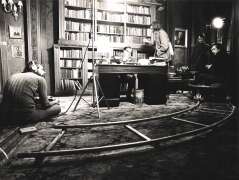Eric Thomas Koerfer
The Death of the Flea Circus Director

Summary
With the help of his assistant Anja, Ottocaro Weiss intends to put the plague
on stage: circumstances beyond his control and a «lack of fresh talent»
have forced him to close down his flea circus. For Weiss, the plague means
the «extinction of everything that makes life miserable and low»,
and freedom along with it. Unbeknownst to him, he has won the support of a
patron who is of the exact opposite opinion: for Johannes Wagner, the plague
is an «organising principle», and, aided by his agent Moosbrugger,
he is able to smuggle a new number onto the programme. Whereas Ottocaro Weiss
means to represent the plague theatrically, what appears on stage is the scientific
reality of the rat-borne infestation.
Wagner believes that he is doing a service to a super-civilised humankind
by unleashing the epidemic, but he is foiled by Weiss, whose need to salvage
his own personal credibility and regain the political dimension he had lost
leads him to exchange the theatre's world of appearances for reality. In the
end, the freedom afforded by the stage is merely an illusion, and is not enough.
Critical note by Marcel Martin
This is the most perfectly Brechtian film to come along in some time. This
qualification, unfortunately too often used up, is here in evidence in the
treatment of the image and the sound (use of intertitles and of off- screen
voice) as well as in the conception of the entire work. The Death of the Flea
Circus Director is a kind of political fable.
Flea circus director Ottocaro Weiss, delightfully interpreted by François
Simon, must find something else to do after the death of his crafty insects.
During a village wake he discovers that the memory of the plague can shake
people out of their consumer- sleep. At the same time, a mysterious capitalist
decides that the terror springing from an eventual plague epidemic could be
an agent for the revival of faith, and a good occasion for him to gain control
of an increasingly subversive society. Ottocaro, without knowing it, becomes
the tool of the diabolical capitalist.
«Ideas have as much contaminating power as diseases» states one
subtitle. But, while the director is a true revolutionary, the capitalist
is obviously trying to propagate reactionary ideas against the red plague
(«A red spectre haunts Europe», wrote Karl Marx, «the one
of communism»), and he wants to rouse a black plague (fascism) which
would throw the terrorised and lost population towards «law and order».
When he is caught, he regrets that he has not paid attention to the fact that
Weiss is a Jew, and was therefore «a natural fomentor of revolution».
Thomas Koerfer's ending, in which one can easily recognise the influence
of the German school, in particular Alexander Kluge, is a brilliant example
of the blossoming of Switzerland's cinema. The film is a difficult and dense
piece of work that requires constant attention. If it's very serious moral
leads to reflection, the humour that nourishes it and the pleasure it gives
us are worthy of Master Brecht.
Marcel Martin, International Critics Week (Cannes 1974)
Critique
A German-Swiss film in the Critics' Week, Thomas Koerfer's The Death of the
Director of the Flea Circus, is overtly a parable: consciously Brechtian,
carefully distanced, worked out with great gravity, but in it's first hour
drily and delightfully comic. Ottocaro Weiss loses his performing fleas in
a crop- spraying operation, seeks compensation from the sort of government
agencies where fleas would never be found, and after a chance encounter with
a macabre village pageant transforms his enterprise into a theatre of the
plague. The meaning of this symbol, and it's relation to anarchy or fascism,
becomes the film's concern; and Weiss worries at it with the intellectual
resolution of a Teutonic terrier, barking up every theoretical tree that the
subject might suggest. Wit and concentration see him through; and in François
Simon he has a marvellous actor, sharp, mournfully intelligent, as fragile
and stalwart as one of his own fleas, winning a total sympathy he never demands.
Kluge would seem to be the main influence on the film; and an influence most
positively assimilated.
Penelope Houston, Sight and Sound

Cast
| Ottocaro Weiss, Flea Circus Director |
François Simon |
| Johannes Wagner, Financier/Patron |
Paul Gogel |
| Stephan Moosbrugger, Intermediary |
Norbert Schwientek |
| Anja, Farm Maid |
Janine Weill |
| Circus Director |
Gotthard Dietrich |
| Insurance Agent |
Gerhard Dorfer |
| TV Editor |
Peter Kner |
| Germanist |
Wolfgang Rottsieper |
| Announcer |
Wolfgang Warncke |
| City Employee |
Edzard Wüstendörfer |
Crew
| Screenplay |
Dieter Feldhausen |
| Camera |
Renato Berta |
| Camera assistant |
Carlo Varini |
| Continuity and editing assistant |
Christiane Lelarge |
| Sound |
Jeti Grigioni |
| Technicians |
Aldo Ricci,
Claudio Ricci,
Ruedi Attinger |
| Music |
Ernst Kölz |
| Mixing |
Aldo Ballabio |
| Costumes |
Ruth Grädel |
| Editing |
Heinz Berner |
| Production design |
Toutschka v. Goldschmidt |
| Location manager |
Luc Yersin |
| Flea Circus |
Peter Mathes |
| Production team |
Jacqueline Burckhardt ,
Titine Mensch,
Peter Schüpbach |
| Director and producer |
Thomas Koerfer |
| Format / Version |
35mm; b/w; German; 1: 1.33 |
| Duration |
111 min |
| Premiere |
Mannheim 1973 |
| Production |
Thomas Koerfer Film Ltd. |
| World rights |
Thomas Koerfer Film Ltd. |
| Distribution Switzerland |
Frenetic Films |
valid HTML & CSS design by almanet.ch,
2004.

